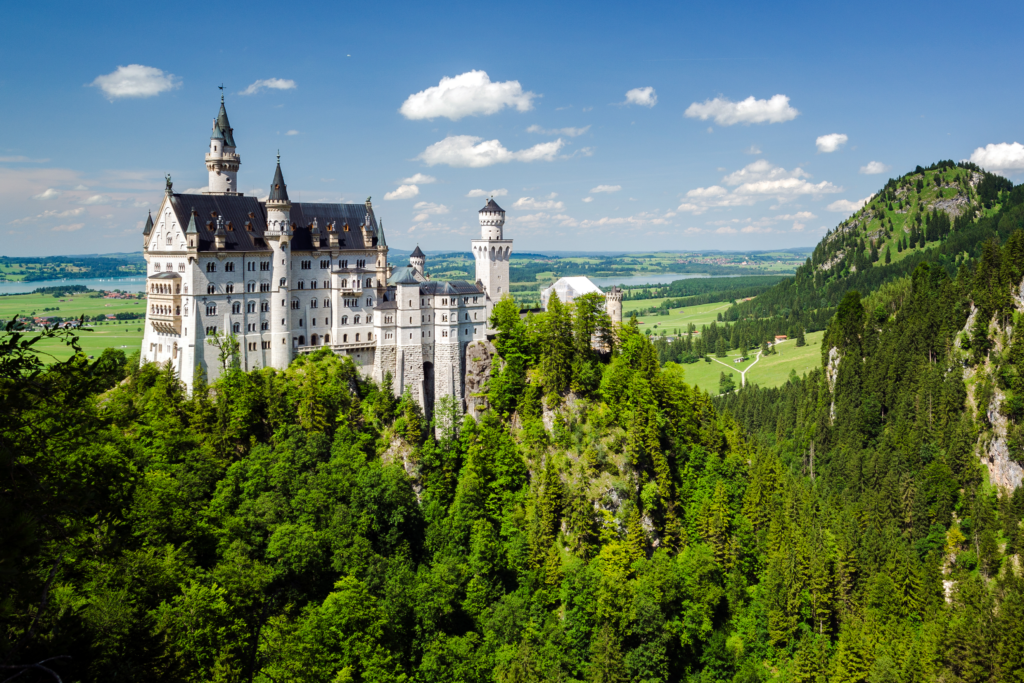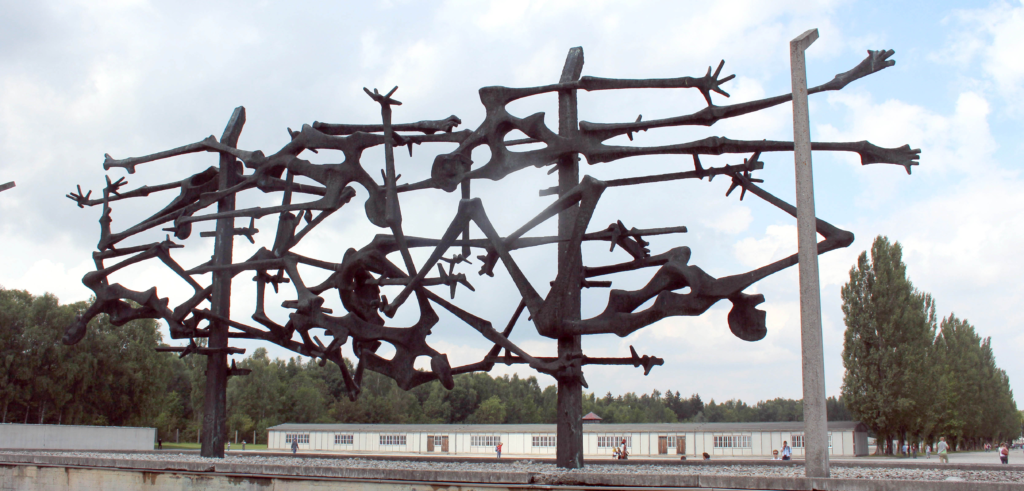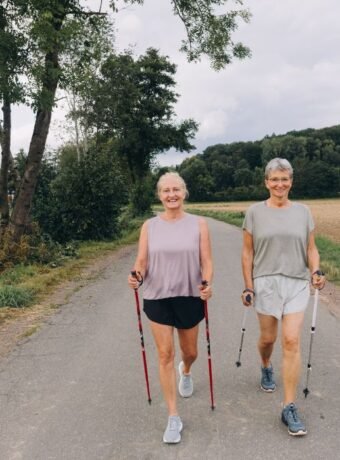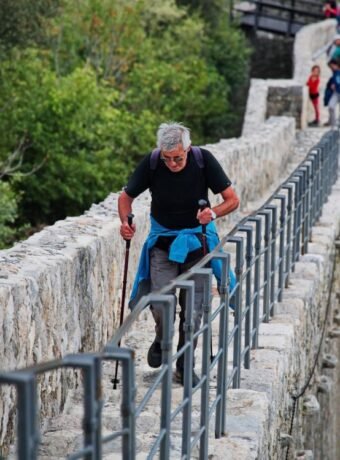Last Updated on June 27, 2025 by Julian Espinosa
Planning your dream European adventure? Germany offers a perfect blend of rich history, stunning landscapes, and welcoming culture that makes it an ideal destination for seniors. This comprehensive guide helps you navigate everything you need for the perfect German tour experience:
- Discover ideal destinations – From fairytale castles along the Rhine to vibrant Berlin and Munich, or the serene Black Forest
- Find the right tour company – Learn what makes a tour truly “senior-friendly” and which companies consistently deliver exceptional experiences
- Navigate accessibility concerns – Understand how to manage mobility considerations at historic sites while still experiencing everything Germany offers
- Pack strategically – Get expert advice on preparing for variable German weather and activities
- Enjoy senior-specific amenities – From centrally located hotels to comfortable transportation and relaxed pacing
With proper planning and the right tour, you’ll discover Germany’s treasures at a comfortable pace while creating lasting memories in one of Europe’s most welcoming countries. Ready to explore centuries of history, indulge in world-class cuisine, and experience authentic German culture? Let’s begin your German adventure!
Selecting the Perfect Senior-Friendly Tour to Germany
When looking for the ideal German tour experience, it’s essential to find options specifically designed with seniors in mind. What makes a tour “senior-friendly”? Let’s explore the key factors to consider.
Understanding Senior-Focused Tours
Senior-focused tours to Germany offer distinct advantages over standard tourist packages. These specialized tours typically feature:
- Relaxed pacing: Itineraries designed with adequate rest periods between activities
- Shorter walking distances: Careful planning to minimize excessive walking while still experiencing key attractions
- Comfortable transportation: Well-equipped buses with easy entry/exit and frequent bathroom stops
- Experienced guides: Knowledgeable leaders who understand seniors’ needs and can adjust plans accordingly
- Centrally located accommodations: Hotels chosen for proximity to attractions, reducing daily transit time
- Included amenities: Many tours offer luggage handling, airport transfers, and most meals
According to a 2023 survey by the European Travel Commission, tours designed specifically for travelers over 60 reported a 94% satisfaction rate compared to 76% for standard tours.
Prefer to listen rather than read?
Top-Rated Tour Companies for Senior Travel to Germany
Based on customer reviews and specialized offerings, these companies consistently rank highest for senior tours to Germany:
- Road Scholar (formerly Elderhostel) offers educational adventures led by expert instructors. Their “Signature Germany” tour combines cultural immersion with comfortable pacing and senior-friendly accommodations. They’re particularly noted for their attentive guides and detailed pre-trip information.
- Overseas Adventure Travel (O.A.T.) specializes in small group travel with a maximum of 16 travelers. Their “Germany’s Cultural Cities & the Romantic Road” tour consistently receives excellent reviews for its balanced itineraries and personalized service.
- Viking River Cruises provides an excellent option for those who prefer to minimize hotel changes. Their Rhine River cruises allow you to unpack once while experiencing multiple German destinations. The ships feature elevators, accessible cabins, and medical staff on board.
- Globus Journeys offers their “German Vista” tour with enhanced accessibility features, including step-free routes where possible and detailed information about walking requirements for each day’s activities.
- Trafalgar Tours provides their “Best of Germany” package with their “Relaxed Pace” option, featuring later start times, longer stays in each location, and carefully vetted accommodations with senior-friendly facilities.
Questions to Ask Before Booking
Before committing to a tour, consider asking these essential questions:
- What is the typical age range of travelers on this tour?
- How much walking is required on an average day?
- Are there many stairs or uneven surfaces to navigate?
- How are accommodations chosen with seniors in mind?
- What assistance is available for those with mobility challenges?
- What is your cancellation policy if health issues arise?
- Are medications and medical equipment easily accessible during travel?
- What is the guide-to-traveler ratio?
Joan Martin, a 72-year-old traveler from Florida, shares: “The most important question I asked was about the pace. Our guide with Globus arranged optional activities for more active seniors while ensuring everyone experienced the highlights comfortably.”
Essential Destinations for Senior Tours in Germany
Germany offers diverse experiences across its 16 federal states. Here are the most popular and accessible destinations frequently included in senior tours:

Bavaria: The Heart of Traditional Germany
Bavaria captures the quintessential German experience many travelers envision. Senior-friendly highlights include:
Munich: The Bavarian capital offers relatively flat walking in its historic center. The Marienplatz with its famous Glockenspiel provides seating at numerous cafés where you can enjoy the atmosphere without standing for long periods. Many tours include leisurely time at the Hofbräuhaus beer hall and guided visits to the BMW Museum with its excellent accessibility features.
Neuschwanstein Castle: While the castle itself involves some climbing, many senior tours offer special transportation options. Some companies arrange for smaller vans to take travelers closer to the entrance, minimizing the uphill walk.
Rothenburg ob der Tauber: This medieval walled town along the Romantic Road features a compact center that’s easily walkable at a relaxed pace. The Christmas Museum and German Christmas Market are particular favorites among senior travelers regardless of the season.

The Rhine Valley: Scenery and Wine Country
The UNESCO-listed Upper Middle Rhine Valley combines breathtaking scenery with charming villages and excellent vineyards:
Rhine River Cruises: Perhaps the most senior-friendly way to experience this region, river cruises offer spectacular views without changing hotels or navigating uneven terrain. Most ships feature panoramic lounges and open decks for comfortable sightseeing.
Rüdesheim: This picturesque wine town offers the Drosselgasse, a narrow lane lined with taverns serving local Riesling wines. The Siegfried’s Mechanical Music Cabinet museum is a unique attraction with excellent accessibility.
Koblenz: Situated at the confluence of the Rhine and Moselle rivers, this 2,000-year-old city features the Deutsches Eck (German Corner) with ample seating areas for enjoying the riverside views and boat traffic.

Berlin: Accessible History and Culture
Germany’s capital city has invested heavily in accessibility and offers rich historical experiences:
Brandenburg Gate and Reichstag: The central historical area is flat and well-maintained. The Reichstag building features elevators and ramps for easy access to its famous glass dome, offering panoramic views without climbing stairs.
Museum Island: Home to five world-class museums, this UNESCO World Heritage site offers excellent accessibility with elevators, ramps, and available wheelchairs at each location.
Berlin Wall Memorial: The outdoor sections are easily accessible, with paved paths and numerous seating areas. The documentation center provides elevators and comprehensive exhibits about this pivotal period in German history.

The Black Forest: Natural Beauty and Wellness
The legendary Black Forest region offers natural splendor with numerous accessible options:
Baden-Baden: This elegant spa town has specialized in wellness travel since Roman times. Many hotels offer thermal spa experiences with accessible facilities, making it perfect for relaxation days during your tour.
Black Forest Open Air Museum: Featuring traditional farmhouses and demonstrations of regional crafts, this museum has worked to make historical buildings as accessible as possible, with paved paths connecting major exhibits.
Cuckoo Clock Route: Many tours include visits to traditional clock-making workshops, which are typically accessible and don’t require extensive walking.

Preparing for Your German Adventure
Thoughtful preparation ensures a smooth and enjoyable experience in Germany.
Health Considerations for Senior Travelers
- Travel Insurance
- Comprehensive coverage is essential. Look for policies specifically designed for seniors that include coverage for pre-existing conditions and potential medical evacuation.
- Medication Management
- Germany has excellent pharmacies (Apotheke), but they may not carry your specific prescriptions. Dr. Elizabeth Chen, travel medicine specialist, recommends: “Always bring twice as much medication as you think you’ll need, keeping some in your carry-on and some in checked luggage. Also, carry a letter from your doctor describing your conditions and medications.”
- European Health Insurance Card (EHIC) or Global Health Insurance Card (GHIC)
- While not replacing travel insurance, these cards can facilitate treatment at public facilities if you’re a citizen of an eligible country.
- Mobile Accessibility
- Many tour companies now offer information about accessibility features of each location through their mobile apps, allowing you to prepare for each day’s activities.
Packing Wisely for German Weather and Activities
Germany experiences four distinct seasons, with weather that can vary significantly:
- Layered Clothing: Even summer evenings can be cool, particularly in Alpine regions. Pack layers that can be added or removed as needed.
- Comfortable Walking Shoes: German cities often feature cobblestone streets. Bring well-broken-in shoes with good support and non-slip soles.
- Rain Protection: A lightweight, packable raincoat and compact umbrella are essential regardless of season. May through September are the rainiest months in most regions.
- Cultural Considerations: Germans tend to dress somewhat formally, particularly for dinner or cultural events. Pack at least one smart casual outfit for special evenings.
Robert Williams, 68, shares his experience: “I didn’t realize how variable the weather would be in June. Having a light jacket and a collapsible walking stick made all the difference when we encountered a rainy day in the Black Forest.”
Language and Communication Tips
While many Germans speak excellent English, particularly in the tourism industry, learning a few basic phrases shows respect and enhances your experience:
- Guten Tag (Good day)
- Bitte (Please)
- Danke (Thank you)
- Entschuldigung (Excuse me)
- Sprechen Sie Englisch? (Do you speak English?)
Technology Helpers: Consider downloading a translation app like Google Translate, which can work offline if you download the German language pack before departure. Many seniors find the camera translation feature particularly helpful for menus and signs.
Emergency Information: Save the European emergency number (112) in your phone, which works throughout Germany for medical, police, or fire emergencies.
Making the Most of Your German Tour
Cultural Experiences Designed for Seniors
Beyond the typical sightseeing, many senior tours to Germany now include immersive experiences tailored to mature travelers:
- Culinary Workshops
- Learn to make traditional German specialties like Black Forest cake or pretzels in classes designed for all ability levels.
- Wine Tastings
- The Rhine, Mosel, and Franconia regions offer seated tastings often conducted in English, allowing you to appreciate Germany’s underrated wines.
- Musical Performances
- From classical concerts in historic churches to opera experiences in cities like Dresden and Munich, performances often offer premium seating options with excellent accessibility.
- Craft Demonstrations
- Watch master craftspeople create traditional German products like cuckoo clocks, hand-blown glass, or fine porcelain. These demonstrations typically require minimal standing or walking.

Dining and Culinary Considerations
German cuisine offers delicious options beyond the stereotypical sausages and beer:
- Regional Specialties: Each region has distinct culinary traditions, from Bavaria’s hearty meat dishes to the seafood of the northern coast.
- Special Dietary Needs: Tour companies have become increasingly accommodating of dietary restrictions. Vegetarian options are widely available, though vegan meals may require advance notice, particularly in rural areas.
- Meal Timing: Germans typically eat dinner earlier than some European countries, with restaurants often serving from 5:30 PM, which aligns well with many seniors’ preferences.
- Coffee and Cake Culture: The German tradition of Kaffee und Kuchen (coffee and cake) in the afternoon provides a perfect rest opportunity during sightseeing days.
Free Time and Optional Activities
Quality tours balance structured activities with free time. Here’s how to make the most of independent hours:
- Local Recommendations: Ask your guide for personally vetted, accessible recommendations rather than just popular tourist spots.
- Public Transportation: Germany’s public transit systems are generally excellent and senior-friendly. Many cities offer reduced fares for seniors or special tourist passes.
- Gardens and Parks: German cities take pride in their public green spaces. Places like the English Garden in Munich or Tiergarten in Berlin offer beautiful, accessible environments for relaxation.
- Shopping Experiences: From Christmas markets to high-end shopping districts, Germany offers excellent shopping opportunities. Many tour companies can arrange for purchases to be shipped home, eliminating carrying concerns.
Managing Mobility and Accessibility Needs
Germany’s historic nature presents occasional challenges for travelers with mobility concerns, but tour operators have developed various solutions:
- Alternative Routes
- Many castles and historic sites have developed alternative access routes. For example, at Heidelberg Castle, while some tour groups climb the steep path, seniors can opt for the funicular railway and enjoy magnificent views while avoiding the climb.
- Accessibility Apps
- Applications like “Wheelmap” and “AccessNow” provide user-generated information about accessibility at specific locations throughout Germany.
- Rest Strategies
- Experienced guides know the best places to sit and rest in major attractions. Don’t hesitate to ask about seating options or alternate viewing points if standing becomes uncomfortable.
- Audio Guides
- Many museums and historic sites offer excellent audio guides, allowing you to enjoy detailed information while seated or moving at your own pace.
Working with Your Tour Guide
A good tour guide can transform your experience, particularly if you have specific needs:
- Communicate Early: Share mobility concerns or health considerations with your guide at the beginning of the tour rather than waiting until difficulties arise.
- Daily Briefings: Pay attention to the guide’s description of the next day’s activities, noting walking distances, terrain challenges, or numerous stairs.
- Alternative Suggestions: If a particular activity seems too strenuous, ask your guide about alternatives. Most experienced guides can quickly arrange taxis or suggest seated observation points.
- Pace Management: Don’t feel pressured to keep up with the most active members of your group. Quality guides are trained to manage different walking speeds without making anyone feel rushed or left behind.
Building Community During Your Tour
One of the greatest benefits of senior group travel is the opportunity to connect with like-minded travelers:
- Group Dinners: Many tours include welcome and farewell dinners. These are excellent opportunities to form connections that may last throughout the trip.
- Shared Interests: Look for tour mates with similar interests or energy levels for optional activities or free-time exploration.
- Stay Connected: Many tour groups create WhatsApp groups or email lists to share photos and maintain contact after returning home.
- Solo Travelers: If traveling alone, let your guide know. They can often facilitate introductions and ensure you feel included in group activities.
Martha Johnson, 76, from Arizona, notes: “I was worried about traveling alone after my husband passed away, but our tour guide to Bavaria made introductions on the first day. I’m still in touch with three couples from that trip four years later!”
Coming Home: Extending the Experience
The best trips continue to provide joy even after returning home:
- Digital Memories
- Take time to organize your photos soon after returning, perhaps creating a digital album to share with family or tour companions.
- German Connections
- Many travelers maintain their interest in German culture through local German restaurants, cultural events, or language learning.
- Travel Reunions
- Some tour groups arrange reunions months after returning, sharing memories and often planning future adventures together.
- Future Planning
- Many senior travelers find that one trip to Germany isn’t enough. Consider which regions you’d like to explore on a future visit, perhaps focusing on a different area such as the less-visited but beautiful northern coast or the eastern states.
Conclusion
Germany offers an ideal balance of fascinating history, beautiful landscapes, excellent infrastructure, and warm hospitality that makes it particularly suitable for senior travelers. With proper planning and the right tour company, you can experience the rich tapestry of German culture at a comfortable pace that allows for true appreciation and enjoyment.
The investment in a quality senior-focused tour pays dividends in peace of mind, enhanced experiences, and newfound friendships. Whether you’re drawn to fairy-tale castles, vibrant cities, serene natural landscapes, or rich cultural experiences, Germany welcomes you with accessible adventures tailored to mature travelers.
Are you ready to experience the warmth and wonder of German culture firsthand? Which region of Germany most captures your imagination? Have you traveled to Germany before, or will this be your first adventure there? We’d love to hear your thoughts and questions in the comments section below!
FAQ: Senior Tours to Germany
- What’s the best time of year for seniors to visit Germany?
- Late spring (May-June) and early fall (September-October) offer ideal conditions with pleasant temperatures, fewer crowds than summer, and extended daylight hours. These shoulder seasons also typically feature lower prices than the peak summer months. Christmas market season (late November through December) is magical but requires preparation for cold weather and potential snow.
- How strenuous are walking tours in German cities?
- This varies by tour company and specific itinerary. Quality senior-focused tours will specify walking distances and terrain difficulties in their brochures or websites. Look for tours classified as “leisurely” or “relaxed pace,” which typically limit walking to 1-2 miles per day on relatively flat surfaces with frequent breaks. Many companies now use a numerical rating system to indicate activity levels.
- What accommodations are made for travelers with hearing or vision impairments?
- Many tour companies provide assistive devices like personal audio systems that allow you to hear the guide clearly even in crowded spaces. For travelers with vision impairments, some companies offer detailed verbal descriptions of sights and can arrange for touchable experiences at certain museums and attractions. Always specify your needs when booking to ensure appropriate accommodations.
- Is it possible to extend my stay before or after the organized tour?
- Most tour companies are happy to arrange pre- or post-tour extensions, often at the same hotels used during the tour and at group rates. This allows you to explore independently while maintaining the security of their support system. Popular extensions include extra days in Munich or Berlin, or side trips to neighboring countries like Austria or Switzerland.
- How do I manage medications that require refrigeration while traveling in Germany?
- Most German hotels provide in-room refrigerators or can arrange refrigeration for medications. For travel days, portable medication coolers are an excellent solution. Inform your tour company in advance about these needs, and they can ensure appropriate accommodations and help arrange solutions during transit days.
- What options exist for seniors who prefer not to climb stairs at historic sites?
- Many historic sites have installed elevators or lifts to improve accessibility, particularly at major attractions. When these aren’t available, quality tour companies often arrange alternative experiences or viewing options. For example, while some travelers might climb the tower at Cologne Cathedral, others could enjoy a detailed virtual tour in the visitor center or a special guided experience of the magnificent ground floor.
- How do I stay connected with family at home while touring Germany?
- Germany has excellent cellular coverage and widely available Wi-Fi. Consider purchasing an international data plan from your home provider or buying a German SIM card upon arrival for unlocked phones. Many seniors find that free communication apps like WhatsApp or FaceTime work perfectly for staying in touch when connected to hotel Wi-Fi.
- What happens if I experience health issues during my German tour?
- Germany has an excellent healthcare system regularly rated among the world’s best. Quality tour companies maintain relationships with English-speaking doctors in major cities and can quickly arrange appointments if needed. For serious issues, tour directors can coordinate with travel insurance providers for appropriate care or evacuation if necessary.
References
- European Travel Commission. (2024). “Senior Travel Preferences and Satisfaction Survey.” Brussels: ETC Research.
- German National Tourist Board. (2024). “Accessible Germany: Travel for All.” Berlin: GNTB Publications.
- World Health Organization. (2023). Geneva: WHO Press.
- American Association of Retired Persons. (2025). “Soaring into 2025: Travel Plans Take Flight Among 50-Plus Travelers” Washington, DC: AARP Research.
- Institute for Quality and Efficiency in Health Care. (2023). Cologne: IQWiG Reports.



